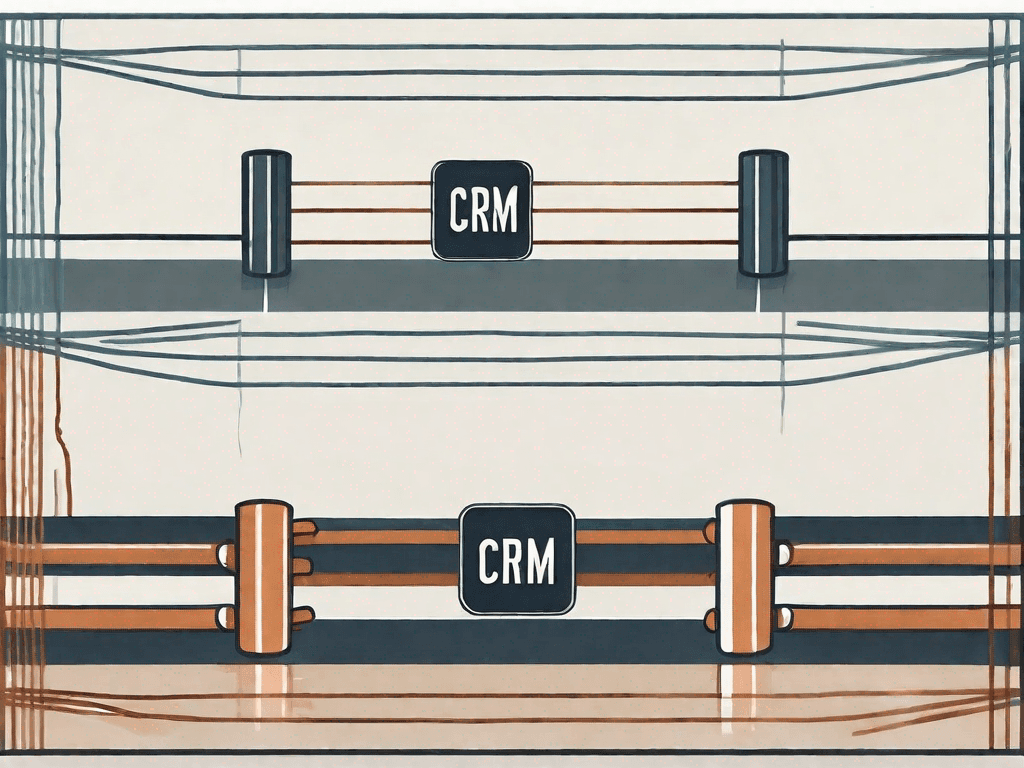
The Ideal Sales Pipeline Template for Accounting Firms
In the fast-paced world of accounting, efficiency is key. Accounting firms need a systematic approach to manage their sales process and ensure smooth operations. That's where a sales pipeline template comes in handy. By providing a structured framework for managing leads and converting them into profitable clients, a sales pipeline template can revolutionize the way accounting firms operate
The 7 Sales Pipeline Stages Accounting Firms Should Have
A well-designed sales pipeline template is essential for accounting firms looking to optimize their sales process. With the right stages in place, firms can efficiently move prospects through the pipeline, converting them into satisfied clients. Here are the seven stages that accounting firms should include in their sales pipeline:
Prospecting: This stage involves identifying and researching potential clients. It's about understanding their needs and determining if they fit your firm's target market.During the prospecting stage, accounting firms should leverage various strategies to identify potential clients. This can include conducting market research, attending industry events, and utilizing online platforms to find leads. By thoroughly researching and understanding the needs of potential clients, accounting firms can tailor their approach and increase the chances of converting prospects into clients.
Initial Contact: Once you've identified promising leads, it's time to reach out to them. This stage is all about making the first connection, whether through phone calls, emails, or networking events.When making initial contact, accounting firms should focus on building rapport and establishing a relationship with potential clients. This can be achieved by demonstrating expertise, offering valuable insights, and showing genuine interest in their business. By making a positive first impression, accounting firms can lay the foundation for a successful sales process.
Qualification: In this stage, accounting firms assess the potential client's needs, budget, and fit with their services. Qualification helps ensure that you focus your efforts on the most profitable opportunities.During the qualification stage, accounting firms should carefully evaluate the potential client's needs and determine if their services align with those needs. This involves conducting thorough assessments, analyzing financial data, and understanding the client's goals. By qualifying leads effectively, accounting firms can allocate their resources efficiently and prioritize opportunities with the highest potential for success.
Proposal: After qualifying a lead, it's time to develop a customized proposal that outlines the services you can offer. This proposal should clearly demonstrate the value your firm can provide.The proposal stage is an opportunity for accounting firms to showcase their expertise and demonstrate how their services can address the client's specific needs. A well-crafted proposal should highlight the unique value proposition of the firm, provide a detailed scope of work, and present a clear pricing structure. By presenting a compelling proposal, accounting firms can differentiate themselves from competitors and increase the likelihood of securing the client's business.
Negotiation: This stage involves negotiating terms, fees, and timelines with the client. It's about finding a win-win solution that meets the client's needs while protecting the bottom line of your firm.Negotiation is a critical stage in the sales process, where accounting firms and potential clients work together to find mutually beneficial terms. This involves discussing pricing, service agreements, and project timelines. Effective negotiation requires active listening, understanding the client's priorities, and finding creative solutions to address any concerns. By reaching a win-win agreement, accounting firms can establish a strong foundation for a long-term client relationship.
Decision: Once the negotiation is complete, the lead must make a decision to proceed or not. Accounting firms should provide all the necessary information and address any concerns to facilitate this decision-making process.The decision stage is when the potential client evaluates all the information presented and makes a choice. Accounting firms should ensure that they provide all the necessary information, answer any questions or concerns, and offer additional support if needed. By facilitating the decision-making process, accounting firms can instill confidence in the potential client and increase the likelihood of them choosing to work with the firm.
Closing: The final stage is closing the deal. Formalizing the agreement, signing the contract, and officially onboarding the client into your accounting firm.The closing stage is where all the hard work pays off. Accounting firms should ensure that the closing process is smooth and efficient, with clear communication and transparency. This involves drafting and finalizing the contract, addressing any last-minute concerns, and officially onboarding the client into the firm's systems. By providing a seamless transition from prospect to client, accounting firms can start the client relationship on a positive note.
Each of these stages plays a crucial role in guiding the prospect through the sales process, ensuring a seamless transition from lead to client. By incorporating these stages into your sales pipeline template, you can streamline your firm's operations and increase your chances of success.
Example of the Customer Journey in a Sales Pipeline for Accounting Firms Step-by-Step
Now that we've outlined the seven stages of an effective sales pipeline template, let's walk through an example of how the customer journey unfolds within an accounting firm:
Prospecting: The firm identifies a potential client, based on their industry, size, and location. Through market research and referrals, they compile a list of leads.
Initial Contact: The firm reaches out to the lead, expressing their interest in working together and scheduling an introductory call.
Qualification: During the call, the firm asks questions to understand the lead's financial needs and assesses if they are a good fit for their services.
Proposal: Based on the information gathered, the firm develops a detailed proposal that outlines the scope of work, fees, and timelines.
Negotiation: The firm and the lead discuss the proposal, addressing any concerns or modifications that need to be made to reach a mutually beneficial agreement.
Decision: The lead takes the proposal to their decision-makers and evaluates it against other options. They consider the firm's expertise, reputation, and pricing.
Closing: The lead decides to move forward and signs the contract. The firm welcomes the new client and begins the onboarding process.
This step-by-step example sheds light on the customer journey within an accounting firm's sales pipeline. It highlights the importance of each stage and how they collectively contribute to achieving successful conversions.
Prospecting is a crucial stage in the customer journey for accounting firms. It involves identifying potential clients who are likely to benefit from the firm's services. Market research plays a significant role in this stage, as it helps the firm understand the specific needs and pain points of their target audience. By focusing on industry, size, and location, the firm can narrow down their list of leads and ensure they are targeting the right prospects.
Once the firm has compiled a list of leads, they move on to the initial contact stage. This is where they reach out to the lead, expressing their interest in working together. The firm may use various communication channels, such as email or phone calls, to establish a connection with the lead. Scheduling an introductory call is an important step in building rapport and understanding the lead's requirements.
During the qualification stage, the firm engages in a detailed conversation with the lead. They ask questions to gain a deeper understanding of the lead's financial needs and determine if their services align with those needs. This stage is crucial in ensuring that both the firm and the lead are a good fit for each other. It allows the firm to assess whether they have the expertise and resources required to meet the lead's expectations.
Based on the information gathered during the qualification stage, the firm develops a comprehensive proposal in the next stage. The proposal outlines the scope of work, fees, and timelines involved in the engagement. It provides the lead with a clear understanding of what to expect from the firm's services. The proposal serves as a crucial document that helps the lead make an informed decision.
Once the proposal is presented, the firm and the lead enter the negotiation stage. This is where any concerns or modifications are addressed to reach a mutually beneficial agreement. The firm may be open to adjusting the scope or fees based on the lead's requirements. Effective negotiation skills are essential in this stage to ensure that both parties are satisfied with the terms of the engagement.
The decision stage is a critical point in the customer journey. The lead takes the proposal to their decision-makers and evaluates it against other options. They consider factors such as the firm's expertise, reputation, and pricing. This stage requires careful consideration and analysis to make the right choice. The firm's ability to showcase their value and differentiate themselves from competitors plays a significant role in influencing the lead's decision.
Finally, in the closing stage, the lead decides to move forward and signs the contract. This marks the successful conversion of a lead into a client. The firm welcomes the new client and begins the onboarding process, ensuring a smooth transition into the engagement. Building a strong relationship with the client from the beginning is crucial for long-term success.
As demonstrated in this example, each stage of the customer journey within an accounting firm's sales pipeline is vital in achieving successful conversions. From prospecting to closing, every step contributes to building relationships, addressing client needs, and ultimately securing new business. By understanding and optimizing each stage, accounting firms can enhance their sales pipeline and drive growth.
Why Accounting Firms need this Sales Pipeline Template?
You'll save time handling financial data for Accounting Firms.
Accounting firms deal with vast amounts of financial data, and inefficient processes can waste valuable time. By implementing a sales pipeline template, firms can automate and streamline their sales activities, freeing up time for more crucial tasks.
You'll grow revenues faster by managing financial accounts efficiently.
A well-structured sales pipeline template ensures that accounting firms can effectively manage their financial accounts. By guiding leads through the pipeline and optimizing the conversion process, firms can increase their revenues and achieve sustainable growth.
In conclusion, the ideal sales pipeline template can be a game-changer for accounting firms. By incorporating the seven essential stages, firms can streamline their sales process, optimize their operations, and achieve faster revenue growth. Furthermore, by saving time and managing financial accounts efficiently, accounting firms can focus on what matters most—providing exceptional financial services to their clients.











































































































































































































